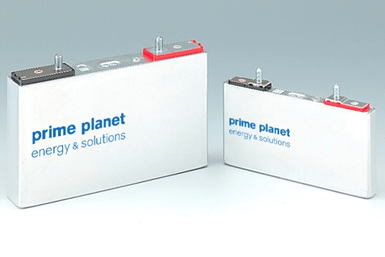Toyota-Panasonic JV to Ramp Up Battery Production in 2022
Hybrids to continue to play a big role in Toyota’s future
#hybrid
Prime Planet Energy & Solutions, the joint venture formed in April by Toyota and Panasonic, will begin making prismatic lithium-ion batteries in 2022.
Production is expected to eventually ramp up to an annual rate to support 500,000 hybrid-electric vehicles per year.
The batteries will be assembled on a new production line within an existing Panasonic plant in Tokushima, Japan. In addition to Toyota models, the plant could supply batteries to the carmaker’s Mazda and Subaru technology partners.
What It Means
The JV’s battery production reaffirms Toyota’s commitment to an electrified future.

(Image: Prime Planet)
Last week, the carmaker said it expects to sell 5.5 million full electric, hybrid and fuel cell vehicles per year by 2025. That’s five years sooner than the company previously planned to hit the milestone.
Hybrids originally were to account for 80% of Toyota’s electrified volume.
The carmaker, which has been a leader in hybrid technology since introducing the Prius in 1997, has slowly started to transition to full EVs in recent years. This includes developing next-generation solid-state batteries that promise to significantly improve driving range and other performance metrics. But widescale deployment of such batteries is at least several years off.
Hybrid Future
The company didn’t provide an updated EV/hybrid split for the 2025 target. But the Prime Planet announcement makes it clear that hybrids will continue to play a major role in Toyota’s strategy for years to come.
"As electrification of automobiles is a must in tackling environmental issues such as global warming and air pollution, the global electric vehicle market is expected to continue growing rapidly,” company officials said in a statement. “This expansion in production capability is a step that allows Prime Planet Energy & Solutions to handle the growing demand of prismatic lithium-ion batteries for hybrid vehicles."
Toyota owns 51% of the JV, with Panasonic holding the remaining stake. The two companies, which have collaborated since 1996, also produce nickel-metal hydride batteries through another joint venture.
RELATED CONTENT
-
The U.S. Military Finds New Roads: Fuel Cell Powered Pickups
While it seems that fuel efficiency as related to the U.S. federal government is all about light duty vehicles, that’s far from being the case.
-
GM Is Down with Diesels
General Motors is one company that is clearly embracing the diesel engine.
-
Behind the Chevrolet Bolt
There are some cars that are simply profoundly important than others, and when it comes to cars introduced of late, the Chevrolet Bolt is certainly one of those particularly notable cars.








